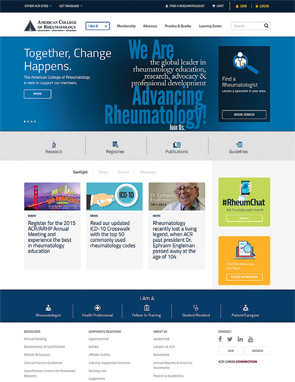CORC is also increasingly focused on insurance issues affecting rheumatologic care and is working toward strengthening relationships with insurance carriers and large self-insured companies to give rheumatologists a voice in their policy decisions. Working with CORC, the ACR staff helped rheumatologists prepare for the change from ICD-9 to ICD-10 coding by presenting more than 50 ICD-10 coding workshops to members and their staff nationwide.
… In Guidelines Development

The redesigned ACR website at is
positioning the College to better meet its members’ needs.
Rheumatologists are highly trained to determine the best treatment for their patients and should not allow other parties, such as payers, to define it for them. The development of treatment guidelines is the responsibility of the Committee on Quality of Care (QOC). This year, the ACR Board of Directors approved new guidelines for the treatment of polymyalgia rheumatica, axial spondyloarthritis and rheumatoid arthritis, and endorsed an important paper about the involvement of patients in guideline development.
As a member of the voting panel for the updated RA treatment guidelines, I can attest to the rigor of the GRADE (Grading of Recommendations Assessment, Development and Evaluation) methodology newly adopted by the QOC for the development of treatment guidelines. The QOC has also been evaluating the best way to efficiently produce and disseminate treatment guidelines and, with the approval of the ACR Board of Directors, took the first steps in bringing guideline development in house. In making this move, the ACR will be able to streamline guideline production and update guidelines whenever new evidence comes to light that may dictate a change in recommendations.
The QOC, in collaboration with CORC, also moved forward in its efforts to develop quality measures in rheumatology. Quality measures will be essential for assessing the process and outcome of rheumatologic care, which incidentally is part of the new Medicare merit-based incentive payment system, a result of MACRA.
… In Practice & Research Support
For several years, the ACR has been investing in the RISE (Rheumatology Informatics System for Effectiveness) Registry. RISE is envisioned to be a valuable resource for improving clinical practice and exploring research questions related to rheumatologic care. Quality measures, particularly those developed by QOC, will be built into RISE for use by its members. Currently, RISE is connected to 220 providers in 47 practices, and has accumulated more than 1 million encounters, including 300,000 visits attributable to 65,000-plus patients with RA. It has vast potential as a limitless source of valuable clinical data.
… In Workforce & Training Issues
The Committee on Rheumatology Workforce and Training Issues (COTW) is a nexus for many important college initiatives. Given the shortage of rheumatologists, the ACR needs a constant flow of information about its workforce to identify important trends that can inform decision making and planning for the future. To this end, the COTW has developed the 2015 workforce study survey, which I encourage you to take. It will update our understanding about the composition of the rheumatology workforce and enable the College to take action both inside and outside the organization to effect change.
